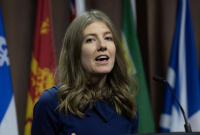Thank you for helping us meet our fundraising goal!
Walking into Expo City in Dubai on my first day at the UN climate summit (COP28), I was overwhelmed by three things: The crowds, the humidity and the unbridled presence of corporate and industry lobbyists.
I was there on behalf of Ecojustice with the express mission of fighting to ensure Canada got its climate plan back on track. Time and again, western countries, including Canada, have failed to live up to promises made on the international stage.
Was our mission accomplished? That ultimately comes down to what Canada does next.
During COP28, Canada released its first Emissions Reduction Plan (ERP) progress report. There is no doubt progress is being made. However, what is also clear from the report is the fossil fuel industry is still the most serious emitter standing in the way of Canada reaching its climate goals.
In what was likely a bid to get ahead of that narrative, on the same day the ERP progress report was released, the federal government announced its long-awaited framework for a cap on emissions. Unfortunately, aside from it still only being a framework — rather than the binding regulation required — industry lobbying led to a proposed cap that is weaker than Canada’s nationwide emissions target of a 40 to 45 per cent reduction by 2030.
Industry lobbying is not new. It’s been around at least since the connection between fossil fuels and climate change was first established. But as the fight against climate change has entered the political mainstream, corporate interests are reaching for new tools to protect their capital interests.
One of these is greenwashing.
According to a coalition that tracks corporate lobbying at climate conferences, in 2023, a whopping 2,456 fossil fuel lobbyists registered to attend COP28. The grounds of the conference were chock full of industry booths peddling the latest and greatest, from “sustainable aviation fuel” to “carbon capture and storage” all in the hopes of prolonging the lifespan and profitability of a dying industry. Despite this presence, perhaps the most talked about outcome of COP28 was the explicit — and decades-delayed — official recognition that we must transition away from fossil fuels to meet our climate targets.
The crux of the matter remains how that can be achieved, not by some nations, but by all. Unless rich countries of the Global North step up in a big way by following through on their monetary commitments to low- and middle-income countries and halting fossil fuel expansion and export, they will remain enablers of an ongoing global catastrophe.
Canada is currently the worst polluter in the G7 group of wealthy countries by any measure. Its wealth was built on a long history of pumping pollution into the atmosphere. Despite the domestic progress outlined in the ERP progress report, there is one area where Canada continues to be woefully behind the times: our export of thermal coal.
Every year, Canada continues to amass wealth through the export of millions of tonnes of thermal coal, including American coal, for sale in other countries. Canada cannot claim to be a climate leader while sitting back and raking in profits that directly result from enabling the reliance by other countries on fossil fuels. It stinks of hypocrisy, particularly as money for loss and damage, mitigation and adaptation from wealthy nations continues to fall pitifully short.
Canada needs to do so much more — starting with a ban on thermal coal exports.
Burning coal remains one of the most significant drivers of climate change. Time is running out, both for humanity and the commitments of the federal government. But it’s not too late to step up.
This week, NDP environment critic Laurel Collins tabled a private member’s bill in the House of Commons to ban the export of thermal coal from Canada. The bill holds the Liberal government to task for a promise it made to ban thermal coal exports as swiftly as possible and by 2030 at the latest.
It also provides the government with the opportunity to prove it is serious about moving away from fossil fuels. Two months out from COP28, its support of MP Collins’ bill could be the first signal it can meet ambition with action.
Whether the COP28 climate conference in Dubai is a turning point in the fight against climate catastrophe will become apparent in the coming months and years. The challenge has been issued and governments around the world must now wrestle with how they phase out fossil fuels. Some of these choices will be difficult, but the decision to ban thermal coal exports is not.
Melanie Snow is Ecojustice's government relations and campaigns specialist who focuses on federal law reform work advocating for a future without funding, export or expansion of fossil fuel projects in Canada and pushing the federal government to ban the export of thermal coal.







Comments